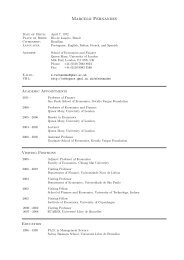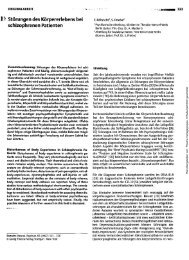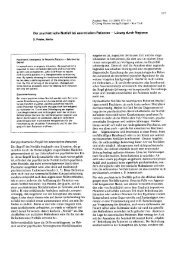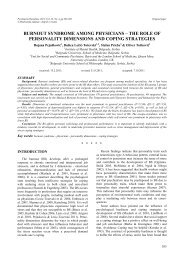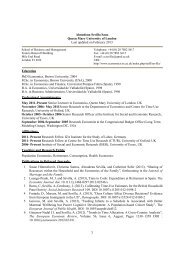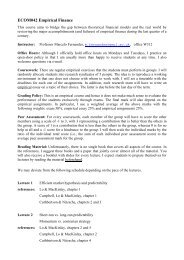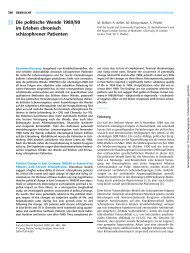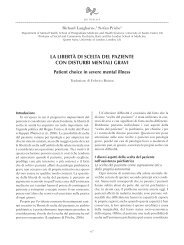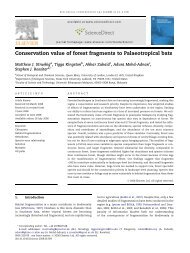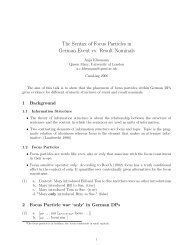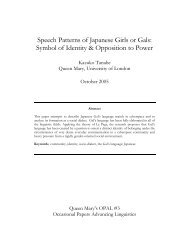Proofs - Personal Webspace for QMUL - Queen Mary, University of ...
Proofs - Personal Webspace for QMUL - Queen Mary, University of ...
Proofs - Personal Webspace for QMUL - Queen Mary, University of ...
Create successful ePaper yourself
Turn your PDF publications into a flip-book with our unique Google optimized e-Paper software.
were then scrutinized independently by three highly competent<br />
bilingual coworkers (i.e., a psychologist, a social worker,<br />
and a graduate student <strong>of</strong> psychology) and were adjusted in a<br />
consensus conference supervised by the principal investigator<br />
<strong>of</strong> the study.<br />
2.3.3. General health (GHQ- 28)<br />
The general health questionnaire (GHQ- 28) presents a<br />
valid and reliable instrument across cultures. It assesses the<br />
recent subjective psychological state along four subscales: (a)<br />
psychosomatic symptoms, (b) anxiety and insomnia, (c) social<br />
dysfunction, and (d) severe depression [20]. Each subscale contains<br />
seven items on a four- point Likert scoring system. Total<br />
scores <strong>for</strong> the GHQ in our sample ranged from 0 to 84. The lower<br />
the score, the better the psychological well- being <strong>of</strong> the subjects.<br />
The internal reliability <strong>of</strong> the Turkish version <strong>of</strong> GHQ- 28 was<br />
found to be highly reliable (Cronbachs α = .82 - .93).<br />
2.3.4. The General Self- Effi cacy Scale (GSE)<br />
The GSE is based on Bandura`s self- effi cacy theory [5]. Self-<br />
effi cacy is an optimistic self- belief that one can achieve his or<br />
her goals or per<strong>for</strong>m a novel or diffi cult task with his or her own<br />
capability despite potential obstacles. The GSE is a 10- item scale<br />
with a four- point Likert scale type <strong>for</strong>mat ranging from [1] “Not<br />
at all true” to [4] “Exactly true” and with a total range from 10<br />
to 41 [27]. The scale is designed <strong>for</strong> adult populations and is<br />
available in 27 languages. The internal reliability <strong>of</strong> GSE from<br />
the 23 nations including Turkey ranged between .76 and .90,<br />
with the majority in the high .80s.<br />
2.3.5. Berlin Social Support Scales (BSSS)<br />
The Berlin Social Support Scales (BSSS) is a multi- dimensional<br />
self- report inventory [44] designed to measure various<br />
dimensions <strong>of</strong> social support (perceived available support, need<br />
<strong>for</strong> support, support seeking, actually received support, provided<br />
support). In the current study, we only used the subjectively perceived<br />
social support as a robust trait, which contains 12 items.<br />
Responses ranged from 1 (strongly disagree) to 4 (strongly<br />
agree). The internal reliability <strong>for</strong> the original BSSS version is<br />
.83 and <strong>for</strong> the Turkish translated version .91.<br />
2.3.6. Social Strain (F- SOZU)<br />
Social Strain is a subscale <strong>of</strong> the German Social Support<br />
Questionnaire F- SOZU [45]. The 12- item subscale assesses<br />
excessive demands, overprotection and rejection. Examples<br />
are “I feel rejected by important people” or “I wish others would<br />
not interfere too much with my life”. The items are rated on a<br />
Likert scale from 1 (totally disagree) to 5 (totally agree). The<br />
internal reliability <strong>for</strong> the German Social Support Questionnaire<br />
F- SOZU is between .81 and .93 and <strong>for</strong> the Turkish translated<br />
version .89.<br />
Z. Bromand et al. / European Psychiatry 27 (2012) / supplement n°2 / S17-S21 S19<br />
2.3.7. NEO- Five Factor Inventory (NEO- FFI)<br />
The NEO Five- Factor inventory (NEO- FFI) is a shortened<br />
version <strong>of</strong> the NEO PI- R designed to measure five stable<br />
domains <strong>of</strong> personality (Neuroticism, Extroversion, Openness,<br />
Agreeableness, and Conscientiousness) [12]. In the current study,<br />
all subjects completed only two dimensions (extraversion and<br />
neuroticism) from a German version <strong>of</strong> NEO- FFI [8]. High scores<br />
on extraversion represent individual differences in the tendency<br />
to experience warmth, gregariousness and assertiveness.<br />
Neuroticism is characterized by anxiety, hostility and depression.<br />
The (NEO- FFI) is a 60- item self- report inventory, which<br />
measures on a fi ve- point Likert- scale (from “strong approval”<br />
to “strong disapproval”). The measurement was also translated<br />
and back- translated into the Turkish language (Neuroticism,<br />
Cronbachs α =.51 <strong>for</strong> translated version; Extraversion, Cronbachs<br />
α = .58 <strong>for</strong> translated version).<br />
2.4. Data analysis<br />
All the analyses were conducted in SPSS/PC version 18.0.<br />
Descriptive statistics <strong>of</strong> the frequencies and means <strong>of</strong> the<br />
demographic variables <strong>of</strong> the study were computed. Missing<br />
data were replaced by the mean <strong>of</strong> nearby points. (chi 2 ) tests<br />
were per<strong>for</strong>med <strong>for</strong> categorical data. Interrelations between<br />
psychosocial variables were assessed using simple Pearson<br />
correlation.<br />
3. Results<br />
3.1. Participant characteristics<br />
<strong>Pro<strong>of</strong>s</strong><br />
A total <strong>of</strong> 105 respondents with a Turkish background participated<br />
in the study. Participants’ mean age was 36.01 years<br />
(SD 9.11; range 21 to 64 years). Most subjects were married<br />
(54.9%), born in Turkey (66.7%) and migrated to Germany <strong>for</strong> social<br />
reasons (family reunion/marriage) (78%). Only 26% <strong>of</strong> the subjects<br />
had a full- time job and more than 72% <strong>of</strong> them had relatively low<br />
household net income with less than 2000 € per month (Table 1).<br />
3.2. Predictors <strong>of</strong> mental health resilience<br />
and vulnerability factors<br />
In all participants, social strain (Pearson’s r=.26*, p



